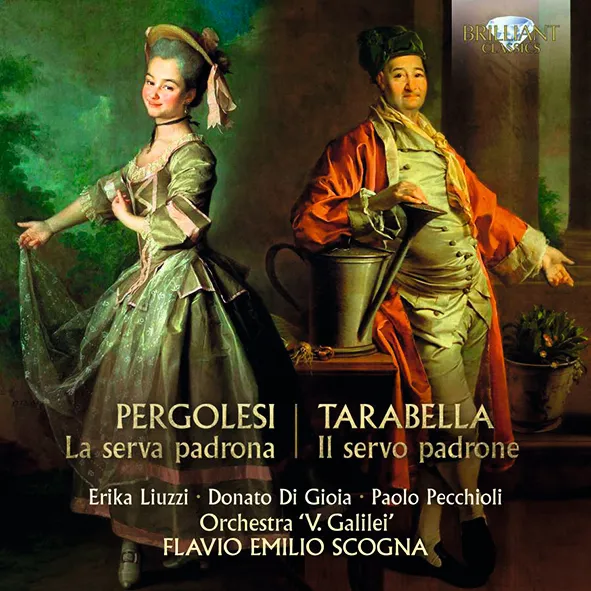
Pergolesi La serva padrona; Tarabella Il servo padrone Erika Liuzzi, Donato di Gioia, Paolo Pecchioli; Chiara Tiboni (harpsichord), Francesco Tomasi (archlute), Andrea Lattarulo (viola da gamba), Marco Santià (piano); Vincenzo Galilei Orchestra/Flavio Emilio Scogna Brilliant Classics 95360 80:27 mins (2 discs)
In 1733 La serva padrona, Pergolesi’s three-person buffa intermezzo, revolutionised opera. In 2017 Il servo padrone, a sequel, was composed by Aldo Tarabella when directing Pergolesi’s work at the Fiesole Music School in Florence. Rather than honouring Pergolesi’s legacy, Tarabella ignores and thereby insults it. La serva padrona is about a clever woman getting ahead: the chambermaid Serpina, helped by a mute fellow-servant, leverages her master’s affection to engineer marriage to him. She gets the best tunes and most toe-tapping rhythms. By contrast, her master Uberto apes opera seria conceits – arioso, affective lurches, rage-like arias – deftly parodied by Pergolesi to demonstrate upper-class idiocy. Tarabella misses Pergolesi’s message and his wit. In his modernist-cum-cabaret score, singers talk as much as sing, hiding behind Sprechstimme the work’s paucity of melodic invention. Uberto dominates the ensemble through percussive, obsessively-repeated syllables; Serpina gets a mocking accompaniment, hissing sibilants and tuneless expostulations.
The story, by Valerio Valoriani, is frankly misogynist: Uberto denies Serpina sex, so that, never having consummated their union, he can divorce her; disguised as a first wife who has unexpectedly resurfaced, Uberto dupes Serpina into marrying the no-longer-mute servant. The performers are at best competent, at worst unprofessional. Paolo Pecchioli, a seasoned bass, commands smouldering lower notes, but his strained upper register undermines the confidence he oozes as Uberto. Erika Liuzzi is simply miscast: instead of sprightly, she’s a dramatic soprano who lards her notes with vibrato and drags the beat. This production is tone-deaf to musical and dramatic taste as well as to Pergolesi.
Berta Joncus
